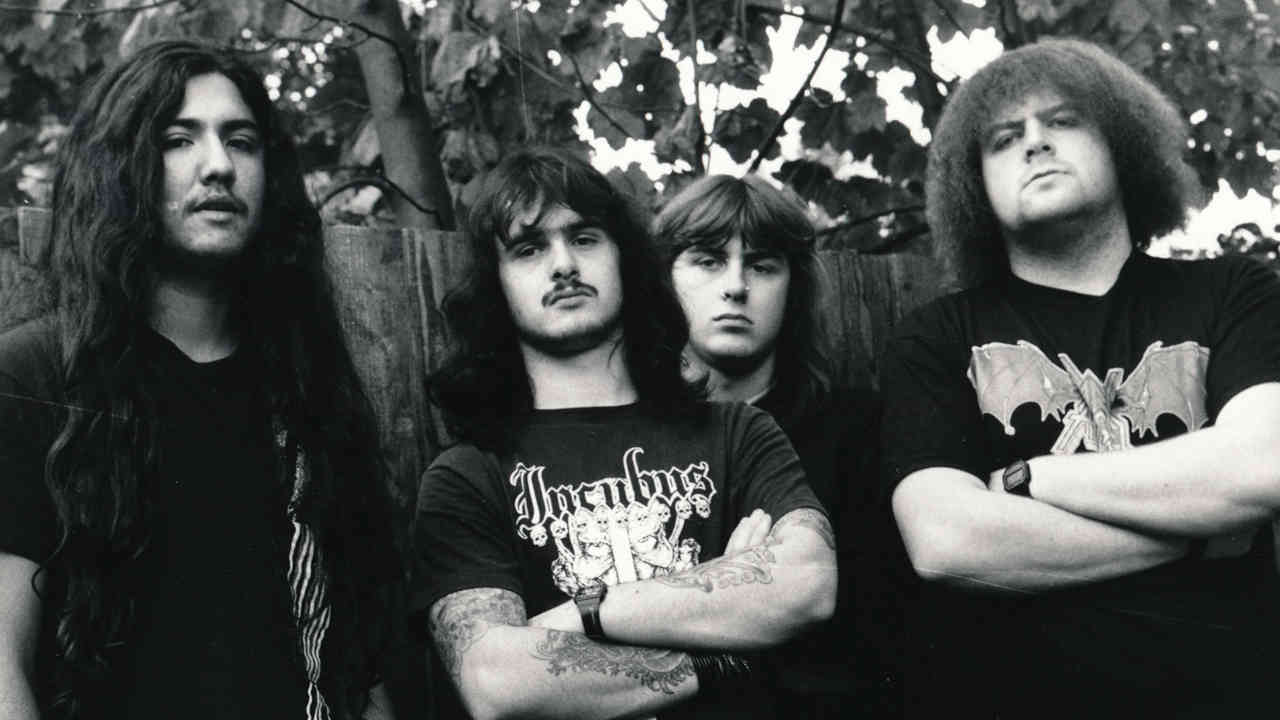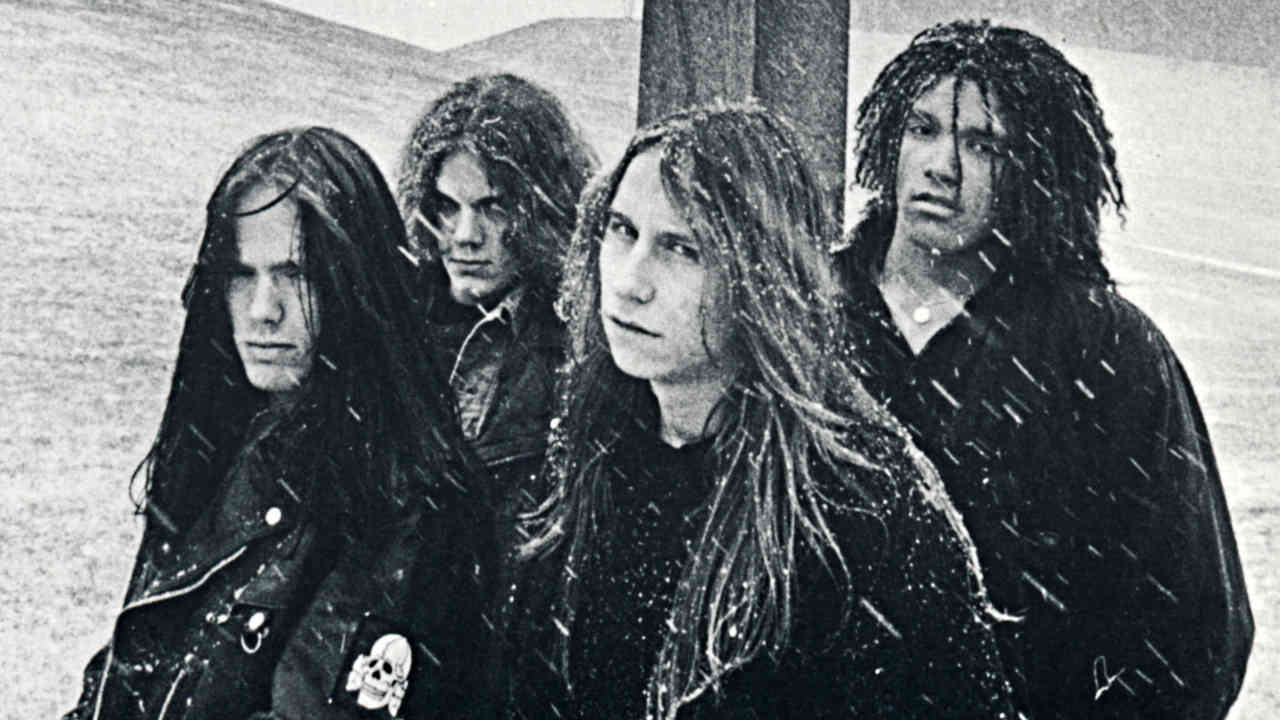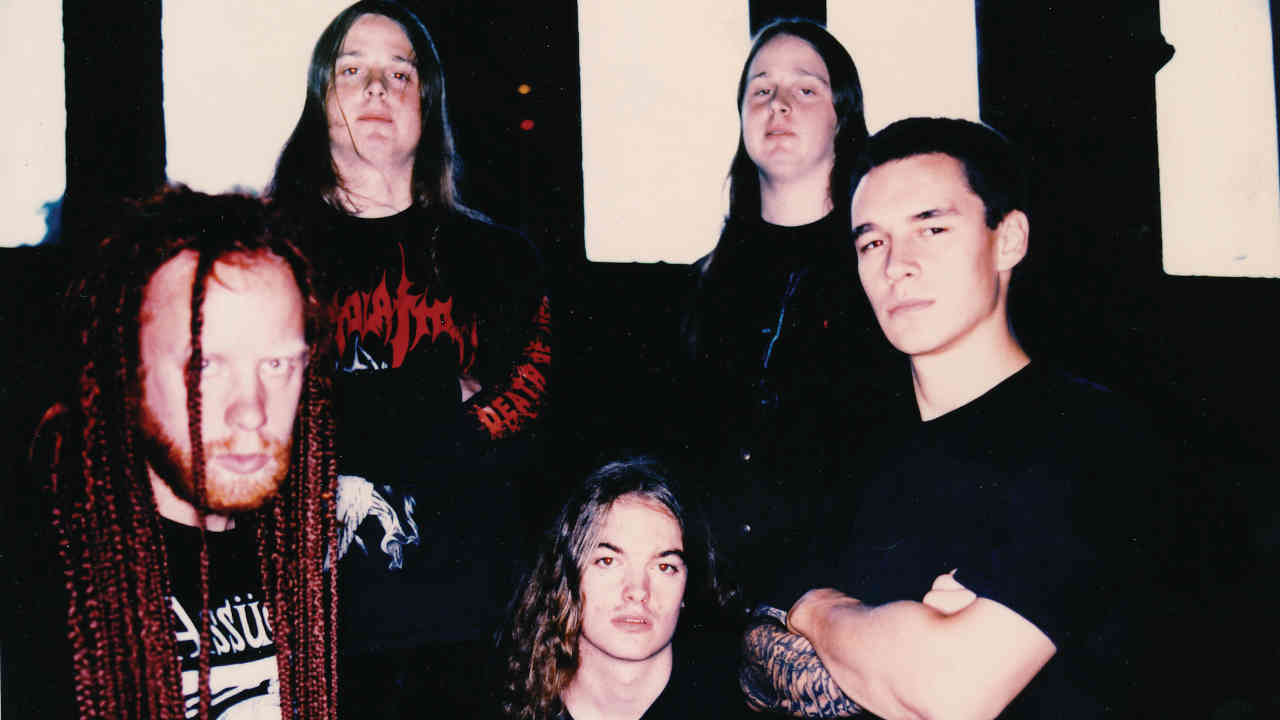“Grindcore really resonated with Americans. Our bands were being noticed before they’d even gone over there”: the ear-splitting history of Earache Records, the label that changed metal

Select the newsletters you’d like to receive. Then, add your email to sign up.
You are now subscribed
Your newsletter sign-up was successful
Want to add more newsletters?

Every Friday
Louder
Louder’s weekly newsletter is jam-packed with the team’s personal highlights from the last seven days, including features, breaking news, reviews and tons of juicy exclusives from the world of alternative music.

Every Friday
Classic Rock
The Classic Rock newsletter is an essential read for the discerning rock fan. Every week we bring you the news, reviews and the very best features and interviews from our extensive archive. Written by rock fans for rock fans.

Every Friday
Metal Hammer
For the last four decades Metal Hammer has been the world’s greatest metal magazine. Created by metalheads for metalheads, ‘Hammer takes you behind the scenes, closer to the action, and nearer to the bands that you love the most.

Every Friday
Prog
The Prog newsletter brings you the very best of Prog Magazine and our website, every Friday. We'll deliver you the very latest news from the Prog universe, informative features and archive material from Prog’s impressive vault.
Few metal labels have been as influential as Earache Records. The Nottingham, UK-based company was pivotal in shaping the extreme metal scene via albums from the likes of Napalm Death, Morbid Angel, Entombed, Godflesh and countless others. In 2013, label founder Digby Pearson looked back on the history of metal’s most ground-breaking label.
From flexi discs to supporters of the underground metal scene. From virtually creating the grindcore genre to signing the most acclaimed blues- rockers of their generation. From offices in Nottingham to… well, offices in Nottingham. The story of Earache Records’ 25 years has been something of a major ride, taking with it some of the biggest and most important names in metal.
The story really begins in 1985, when a young, idealistic Digby Pearson decided to try his hand at releasing records from some of his favourite hardcore and punk bands.
“I was a big fan of the scene and knew a lot of the bands. In fact, I had helped to promote it and the next logical step was to put out records by some of these bands,” says Digby.
However, Digby had no knowledge at the time of what it took to release a record. All he had to drive him forward was a single-minded determination.
“Me and my mate Kalv, who was the bassist in Heresy, pooled our money and sold off our record collections so we could scrape together enough cash to finance some records. We did two compilations, featuring bands like The Stupids and Septic Death (the latter included Pushead, who’d go on to make a huge name for himself as a graphic artist working with the likes of Metallica) and a Heresy EP (Never Healed). We pressed them up as flexi discs, which were quite popular at the time. Magazines were giving away flexis, and they were cheaper to manufacture than the usual vinyl.”
At the time, Digby and Kalv were not running a proper label. They had no clue how to get distribution sorted out for these releases. But, thanks to an innate business sense and cunning, Digby was able to ensure these records sold.
Sign up below to get the latest from Metal Hammer, plus exclusive special offers, direct to your inbox!
“I had a list of contacts around the world, and through them we managed to sell about 5,000 copies. They were my distribution network. The aim, of course, was to make back the money we’d spent, and also to be able to give bands something as well. As we progressed I started to become quite good at the business side of things. I really felt at home.”

By this juncture, Digby had quit university and was also unemployed, but in 1987 a government scheme persuaded him to set up Earache as a legitimate record label.
“Something called the Enterprise Allowance Scheme had just come in. This encouraged young people to set up their own businesses. They gave you some financial help, and every- one I knew was on the scheme. It occurred to me that I could get my own label going. I already had the Earache name, but I was running things on my own. There was no staff.”
The first release through the fledgling Earache label was The Return Of Martha Splatterhead from Seattle punk band The Accused, and Digby quickly learned an important business lesson with this album.
“I had no idea about how to get records into the shops,” he explains. “The flexi discs had been marketed through my mailing list, but I wanted Earache to go ‘legitimate’, so I needed to sort out a distribution deal. A guy called Tim Bennett, who ran the Children Of The Revolution (COR) label, offered to help. He got a deal sorted with a company called Revolver, who were part of The Cartel, and they dealt with small independent labels like mine. So it was agreed that The Accused album would actually come out on both Earache and COR, and it’s the only time I’ve ever put out any record in conjunction with another label. It was a huge mistake.”
Financially bruised from the encounter, Digby decided to go it alone. Thankfully, Revolver were impressed enough to sign up Earache directly, the next release being a Hirax/Concrete Sox split record. But it was the next record that was not only to make the infant company’s reputation, but also start a musical revolution. It was Scum, the debut from Napalm Death.
“I’d known the guys for ages. I’d driven with them to so many of their gigs and they’d stayed round my house. They wanted to release a split album with another band. In fact, they’d already split up after recording Scum, and didn’t really care about it. But I always thought it should be a standalone Napalm Death record, and persuaded drummer Mick Harris to put together a new lineup to record more material. That’s why there are two different bands involved with the record. Side One of the vinyl has the first band and Side Two has the second.”
Scum proved to be a sensation when it was put out by Earache in June 1987 – it effectively kickstarted the whole grindcore scene.
“Grindcore was brutal death metal with hardcore leanings put through an accelerator. The thing about Napalm was that they appealed to metal fans and also to hardcore ones. The lineup that did the second side of the album had two metalheads – guitarist Bill Steer and bassist Shane Embury – and two punks – vocalist Lee Dorrian and Mick Harris – and the combination was just amazing. To me, this was experimental music. Napalm Death were pushing the envelope on so many levels.”
What also helped the band, genre and label’s cause was the patronage of tastemaking UK DJ John Peel.
“I only sent out eight promo copies of the record to the media – unlike today when it seems like we send out thousands – and John Peel picked up on it immediately. He played Scum on his Radio One show, and it gave us vital exposure. As a result of this to some extent, Napalm Death got to the top of the indie charts, ahead of The Smiths and New Order, who were so trendy back then.”
As the grindcore scene grew, so did Earache’s credibility, as Digby explains:
“I think I’m right in saying that seven of the first 10 bands to get releases on the label got Peel sessions, which was a really high percentage. That led to a snowball effect. But the whole thing was very much a grass- roots thing. There were no idiots involved with these bands, nor anyone preaching dodgy politics. People who were part of it were very much down to earth and real.”
Of course, not everyone had Digby’s vision at the time. While he could see the grindcore movement gathering an unmistakable and unstoppable momentum, one of the founders was more sceptical.
“I remember [future Godflesh frontman] Justin Broadrick, who was in the first Napalm Death lineup, telling me that it wouldn’t last and that it was just a passing trend. He even decided to join Head Of David, whom he believed would have more longevity. Now I mean no disrespect to Head Of David – they were a good band on Blast First, a quality label – but I did wonder how he felt when Napalm sold out the Kilburn National in 1989.”
This was the same year that what had started as a one-man label from Digby’s bedroom moved into offices.
“We were still in Nottingham, and those are the same offices we have today. It was never a plush, corporate set-up. There are always boxes cluttering up the space, full of CDs, vinyl or posters. I never saw the point in having office furniture. All I have is a desk, a fridge…and a plasma television.”
One of the key ways in which Earache expanded their roster was by looking for exciting bands on a global scale.
“That was the secret to the way in which grindcore took hold. It happened in so many different countries, and we were there, signing up the best. We even went to Poland to get Vader. When they first arrived, none of them could speak a word of English. I can’t imagine now how we communicated with them. But it was exciting to have bands like them from places with no previous history for good bands.”
America was also to prove a healthy hunting ground for the label. “The whole grindcore thing really resonated with Americans,” says Digby. “Our bands were being noticed before they’d even gone over there.”
In 1993, Digby negotiated a landmark deal with Sony, one that was groundbreaking.
“We agreed a licensing deal with them, the likes of which had never been done before. They picked up seven of our bands in one go. The States were looking for the next major musical movement, because grunge had made its impact and was on the way out. They looked at what we had, and the impact the music was having, and believed this was gonna be big.”
Looking back now on the way Earache worked so closely with bands, Tomas Lindberg of At The Gates feels they played a pivotal role.
“I guess you can divide the At The Gates history into two (at least) parts, with the early days being about musical experimentation and artistic freedom,” says Tomas. “When we wanted to step it up, Earache provided the push and the confidence that we needed, I think we came out so much stronger after we signed to them. We never had any problems with them. And always felt that they were 100 per cent behind us.”

But there was an inevitable downside to the way in which Earache related to their bands. Not all are as positive now as At The Gates. J S Clayden of industrial-metallers Pitchshifter has recently been criticised by Digby for having what he perceived as an arrogant rock star attitude. That’s something which hasn’t gone down well at all with the frontman.
“There was a certain level of bravado in our camp through being at our peak in our 20s (being on the covers of magazines, headlining shows, etc),” he says. “Regardless, I would suspect that such a comment (if indeed true) was made more in relation to my unwillingness to take things lying down. Pitchshifter was (and still are) just five punk kids from crappy UK housing estates trying to experience the joy of making music and telling people about their own beliefs in the process. Although Earache may well have started out the same way, it seemed, from my perspective at least, to quickly shift away from that singularity and into the realm of making any compromise to make money, regardless of the impact on the artists.”
“Look, Earache were definitely a positive force in the early days,” says Napalm Death frontman Barney Greenway, who has also been the subject of negative comments from Digby about his attitude towards the label. “And you have to give them great credit for the pivotal role they played in establishing the UK hardcore and grindcore scene. But Digby was always reluctant to spend money, even though he had committed to doing this when signing bands to the label. It was as if he felt that once a band started to do well, then he didn’t need to fulfil his side of the bargain.
“But I have tried in recent times to avoid being critical of Earache. In the end, it does nobody any good. Let’s all move on, and remember that at the beginning the label were the ideal bedfellows for Napalm Death.”
From his point of view, Digby feels that his relationship with some artists changed as they got bigger and the business side of things became increasingly complicated.
“My problem was in trying to keep everyone happy. As the bands got bigger, so they took on managers. That meant I was no longer able to talk direct to them to sort things out, and had to go through someone else, who was there to make money and didn’t have the same love for the music as we all did.”
Despite the greater demands being made on his label, time and financial resources, Digby still pushed forward with signing pioneering bands from across the world during the 1990s.
“Our track record was fantastic. We got Morbid Angel from Florida, who were crucial in the way that death metal developed. We took on Entombed from Sweden, and we all know how important they became. Look at the first 100 releases on Earache. It was an unbroken run of classic bands who put extreme metal on the map. You only have to name them now, to realise what we achieved. Godflesh, Bolt Thrower, Carcass… it was an amazing time, and I am so proud of what we did together.”
Earache carried on breaking fresh ground as the decade wore on. While other labels seemed to struggle, there was no sign of a waning in the fortunes for Earache.
“We got Clutch for the Passive Restraints EP in 1992, and they were so naive that I had to explain to them why they needed a producer. They left us to go to major labels, so it was obvious we knew what we were talking about.”
They cast their net musically even wider when signing doom heroes Sleep for their 1993 classic album, Holy Mountain. And Digby recalls the band’s next move with wry amusement.
“They signed to London Records for the Jerusalem album and handed in 70 minutes of music that was all one track! Of course, being a major label London didn’t understand what Sleep were trying to do and promptly dropped them. It’s probably a case of the band being better off with us. But we’ve had a lot of acts over the years who’ve moved to other record companies. I never have a problem with that, and wish them luck.”
The story of The Dillinger Escape Plan is another interesting example of the way that Earache work.
“They were signed in America to a small label called Now Or Never, which was run by someone who also worked for us as an intern for a while,” recalls Digby. “When I heard their self-titled EP [put out in the States in 1997], I knew there was something special going, so I picked up the record for the UK and Europe. Again, it was a case of going with my instincts, and even though they only had the one record on Earache, it got them a lot of attention.”
One thing Earache have steadfastly refused to do is follow trends. Which is why they never went for nu metal acts at the start of the 21st century, and ignored the metalcore explosion.
“In the end it all comes down to my taste. I have to like a band to sign them, which is why I won’t have anything to do with black metal. But we aren’t rooted in the 90s still, as some people suggest. We’ve been at the forefront of the recent thrash revival, thanks to bands like Evile and Municipal Waste. And I love Eskimo Callboy from Germany. They really polarise opinions, but I’m sure they’re gonna happen.”
In 2013, aware that the extreme metal scene wasn’t the powerhouse it once was, Earache pulled a surprising left turn and signed US blues rockers Rival Sons. It would start a new chapter in Earache, one in which they forsook the death metal and grindcore of old for more more mainstream fare. Digby remains unrepentant.
“For me, it’s the only form of music these days which has genuine passion,” he says “It’s been a while since we had a band break through and blow people’s minds. It’s like the good old days are back for Earache!”
Originally published in Metal Hammer issue 239
Malcolm Dome had an illustrious and celebrated career which stretched back to working for Record Mirror magazine in the late 70s and Metal Fury in the early 80s before joining Kerrang! at its launch in 1981. His first book, Encyclopedia Metallica, published in 1981, may have been the inspiration for the name of a certain band formed that same year. Dome is also credited with inventing the term "thrash metal" while writing about the Anthrax song Metal Thrashing Mad in 1984. With the launch of Classic Rock magazine in 1998 he became involved with that title, sister magazine Metal Hammer, and was a contributor to Prog magazine since its inception in 2009. He died in 2021.

